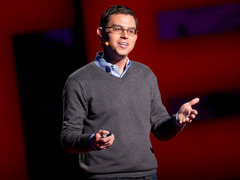
Joshua Foer at TED2012. Photo: James Duncan Davidson
Joshua Foer thought he might have set out on a fool’s errand when he started training to compete in the U.S. Memory Championship. Only, he ended up winning it in 2006.
 Joshua Foer: Feats of memory anyone can do
In his talk from TED2012, Foer shares the simple trick of memory that helped him become a champion — creating a memory palace that helps you physically and spatially locate memories in a familiar space. But can anyone do this? This week’s TED Weekends on the Huffington Post explores the power of memory. Below, three essays to pique your interest.
Joshua Foer: Feats of memory anyone can do
In his talk from TED2012, Foer shares the simple trick of memory that helped him become a champion — creating a memory palace that helps you physically and spatially locate memories in a familiar space. But can anyone do this? This week’s TED Weekends on the Huffington Post explores the power of memory. Below, three essays to pique your interest.
Joshua Foer: The Secret to Superpower Memory
Last weekend in New York City, Ram Kolli defeated the reigning USA Memory Championship Nelson Dellis to win the 16th annual USA Memory Championship. Readers of my book Moonwalking with Einstein: The Art and Science of Remembering Everything will remember Kolli as the “mental athlete” I went toe-to-toe with when I won that same contest in 2006.
Here’s the thing: Despite being U.S. memory champions, Kolli, Dellis, and I occasionally misplace our car keys, just like everyone else. We don’t actually have great memories. Rather, we know how to use the memories we’ve got more effectively in certain contexts, thanks to a set of mnemonic techniques invented in antiquity.
One of those techniques, known as the memory palace, was supposedly invented by a Greek poet 2,500 years ago. Read the rest of the essay »
Dr. R. Keith Sawyer: The Creative Power of Memory
Here’s a provocative claim: Great creativity is based in great memory. If we enhance our ability to remember, we will become more creative. You probably think that memory is the exact opposite of creativity. After all, the things you memorize already exist — they’re not new. And creativity is all about a new idea that didn’t exist before… right?
Well, not exactly. Creative insights always come from combinations of existing mental material. New ideas don’t just appear out of thin air; they build on existing ideas, concepts, and perceptions that you’ve stored in your mind over the years. Researchers have discovered that major creative insights tend to happen only after you work many years in an area — because it takes years to absorb the many small bits of mental material that will feed your creative process. If you don’t remember all of this material, then it won’t be available as raw material to your mind’s insight generating combination machine. Read the rest of the essay »
Gayatri Dev, M.D.: Your Diabolically Lazy Brain
Your brain is pretty darn incredible. It grasps quantum physics and converts cow manure into biofuel with the same alacrity that it overeats, skips out on spin class, and hits the snooze button on the alarm, particularly, especially, when it knows it shouldn’t. Joshua Foer finds himself the winner of a memory contest without any prior claims to an exceptional memory. He found that all he had to do was train the brain.
In other words, what your grandma told you was true: Habits are first cobwebs, then cables. If we keep doing something, the involved brain circuits become very strong. Which is why it is best not to take up midnight ice cream raids in the first place. The night call of the refrigerator siren is irresistible once the neurologic cables that heed her call are laid. Read the rest of the essay »
Comments (6)
Pingback: Memory (5) – Memoir resources
Pingback: Ultimate Language Learning Guide: From Scratch to Polyglot
Pingback: Feats of Memory anyone can do | Free psychology
Pingback: Moonwalking with Einstein | Tyana Mohamed